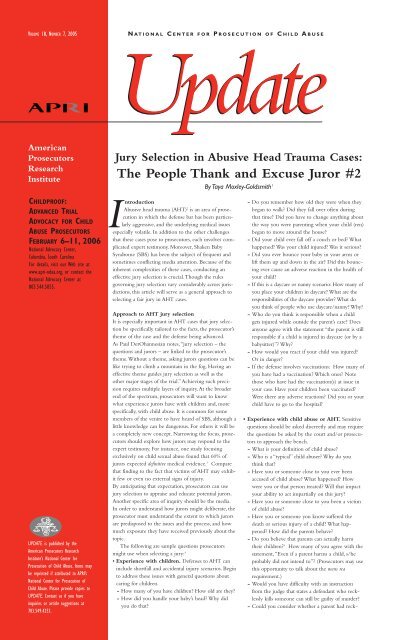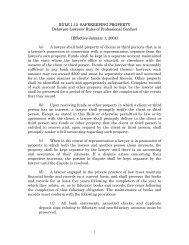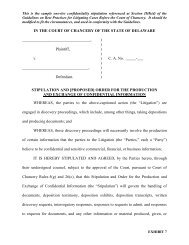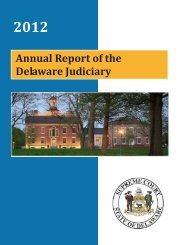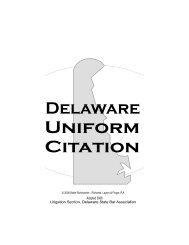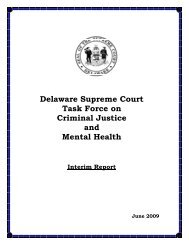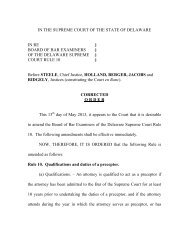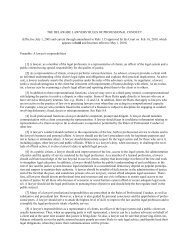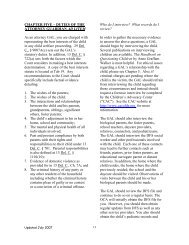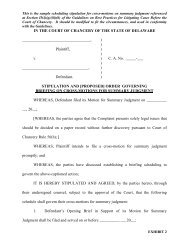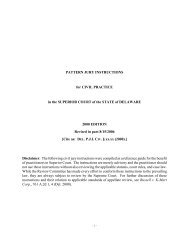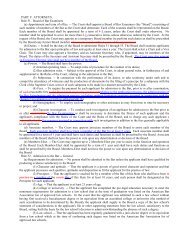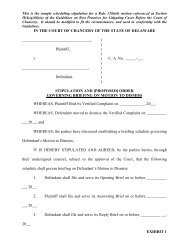The People Thank and Excuse Juror #2 - National District Attorneys ...
The People Thank and Excuse Juror #2 - National District Attorneys ...
The People Thank and Excuse Juror #2 - National District Attorneys ...
Create successful ePaper yourself
Turn your PDF publications into a flip-book with our unique Google optimized e-Paper software.
VOLUME 18, NUMBER 7, 2005<br />
N ATIONAL C ENTER FOR P ROSECUTION OF C HILD A BUSE<br />
Update<br />
American<br />
Prosecutors<br />
Research<br />
Institute<br />
CHILDPROOF:<br />
ADVANCED TRIAL<br />
ADVOCACY FOR CHILD<br />
ABUSE PROSECUTORS<br />
FEBRUARY 6–11, 2006<br />
<strong>National</strong> Advocacy Center,<br />
Columbia, South Carolina<br />
For details, visit our Web site at<br />
www.apri-ndaa.org, or contact the<br />
<strong>National</strong> Advocacy Center at<br />
803.544.5055.<br />
UPDATE is published by the<br />
American Prosecutors Research<br />
Institute’s <strong>National</strong> Center for<br />
Prosecution of Child Abuse. Items may<br />
be reprinted if attributed to APRI’s<br />
<strong>National</strong> Center for Prosecution of<br />
Child Abuse. Please provide copies to<br />
UPDATE. Contact us if you have<br />
inquiries or article suggestions at<br />
703.549.4253.<br />
I<br />
Jury Selection in Abusive Head Trauma Cases:<br />
<strong>The</strong> <strong>People</strong> <strong>Thank</strong> <strong>and</strong> <strong>Excuse</strong> <strong>Juror</strong> <strong>#2</strong><br />
By Taya Moxley-Goldsmith 1<br />
ntroduction<br />
Abusive head trauma (AHT) 2 is an area of prosecution<br />
in which the defense bar has been particularly<br />
aggressive, <strong>and</strong> the underlying medical issues<br />
especially volatile. In addition to the other challenges<br />
that these cases pose to prosecutors, each involves complicated<br />
expert testimony. Moreover, Shaken Baby<br />
Syndrome (SBS) has been the subject of frequent <strong>and</strong><br />
sometimes conflicting media attention. Because of the<br />
inherent complexities of these cases, conducting an<br />
effective jury selection is crucial.Though the rules<br />
governing jury selection vary considerably across jurisdictions,<br />
this article will serve as a general approach to<br />
selecting a fair jury in AHT cases.<br />
Approach to AHT jury selection<br />
It is especially important in AHT cases that jury selection<br />
be specifically tailored to the facts, the prosecutor’s<br />
theme of the case <strong>and</strong> the defense being advanced.<br />
As Paul DerOhannesian notes,“jury selection – the<br />
questions <strong>and</strong> jurors – are linked to the prosecutor’s<br />
theme.Without a theme, asking jurors questions can be<br />
like trying to climb a mountain in the fog. Having an<br />
effective theme guides jury selection as well as the<br />
other major stages of the trial.”Achieving such precision<br />
requires multiple layers of inquiry.At the broader<br />
end of the spectrum, prosecutors will want to know<br />
what experience jurors have with children <strong>and</strong>, more<br />
specifically, with child abuse. It is common for some<br />
members of the venire to have heard of SBS, although a<br />
little knowledge can be dangerous. For others it will be<br />
a completely new concept. Narrowing the focus, prosecutors<br />
should explore how jurors may respond to the<br />
expert testimony. For instance, one study focusing<br />
exclusively on child sexual abuse found that 60% of<br />
jurors expected definitive medical evidence. 3 Compare<br />
that finding to the fact that victims of AHT may exhibit<br />
few or even no external signs of injury.<br />
By anticipating that expectation, prosecutors can use<br />
jury selection to appraise <strong>and</strong> educate potential jurors.<br />
Another specific area of inquiry should be the media.<br />
In order to underst<strong>and</strong> how jurors might deliberate, the<br />
prosecutor must underst<strong>and</strong> the extent to which jurors<br />
are predisposed to the issues <strong>and</strong> the process, <strong>and</strong> how<br />
much exposure they have received previously about the<br />
topic.<br />
<strong>The</strong> following are sample questions prosecutors<br />
might use when selecting a jury: 4<br />
• Experience with children. Defenses to AHT can<br />
include shortfall <strong>and</strong> accidental injury scenarios. Begin<br />
to address these issues with general questions about<br />
caring for children.<br />
- How many of you have children How old are they<br />
- How did you h<strong>and</strong>le your baby’s head Why did<br />
you do that<br />
- Do you remember how old they were when they<br />
began to walk Did they fall over often during<br />
that time Did you have to change anything about<br />
the way you were parenting when your child (ren)<br />
began to move around the house<br />
- Did your child ever fall off a couch or bed What<br />
happened Was your child injured Was it serious<br />
- Did you ever bounce your baby in your arms or<br />
lift them up <strong>and</strong> down in the air Did this bouncing<br />
ever cause an adverse reaction in the health of<br />
your child<br />
- If this is a daycare or nanny scenario: How many of<br />
you place your children in daycare What are the<br />
responsibilities of the daycare provider What do<br />
you think of people who use daycare/nanny Why<br />
- Who do you think is responsible when a child<br />
gets injured while outside the parent’s care Does<br />
anyone agree with the statement “the parent is still<br />
responsible if a child is injured in daycare (or by a<br />
babysitter)” Why<br />
- How would you react if your child was injured<br />
Or in danger<br />
- If the defense involves vaccinations: How many of<br />
you have had a vaccination Which ones Note<br />
those who have had the vaccination(s) at issue in<br />
your case. Have your children been vaccinated<br />
Were there any adverse reactions Did you or your<br />
child have to go to the hospital<br />
• Experience with child abuse or AHT. Sensitive<br />
questions should be asked discreetly <strong>and</strong> may require<br />
the questions be asked by the court <strong>and</strong>/or prosecutors<br />
to approach the bench.<br />
- What is your definition of child abuse<br />
- Who is a “typical” child abuser Why do you<br />
think that<br />
- Have you or someone close to you ever been<br />
accused of child abuse What happened How<br />
were you or that person treated Will that impact<br />
your ability to act impartially on this jury<br />
- Have you or someone close to you been a victim<br />
of child abuse<br />
- Have you or someone you know suffered the<br />
death or serious injury of a child What happened<br />
How did the parents behave<br />
- Do you believe that parents can actually harm<br />
their children 5 How many of you agree with the<br />
statement,“Even if a parent harms a child, s/he<br />
probably did not intend to” (Prosecutors may use<br />
this opportunity to talk about the mens rea<br />
requirement.)<br />
- Would you have difficulty with an instruction<br />
from the judge that states a defendant who recklessly<br />
kills someone can still be guilty of murder<br />
- Could you consider whether a parent had reck-
lessly, rather than intentionally, killed or injured a child Can you accept<br />
that reckless killing of a child is a crime<br />
- Do you believe that a child can be severely injured <strong>and</strong>/or die as the<br />
result of one abusive incident (Abusive head trauma can be a one-time<br />
incident resulting in the death or severe disability of a child.)<br />
- Do you feel that you would need an eyewitness in order to find the<br />
defendant guilty Why or why not Would you be surprised to know<br />
that few criminal cases have eyewitnesses<br />
- Has anyone heard of Shaken Baby Syndrome Can you describe what<br />
that means What should happen to someone who does that<br />
- How many of you believe that it is ever appropriate to shake a<br />
child/infant<br />
• Expert witnesses: <strong>The</strong>se cases can often become a battle of the experts.<br />
<strong>Juror</strong>s need to be able to assess both the substance <strong>and</strong> credibility of<br />
expert testimony <strong>and</strong> not be persuaded simply by the fact that a witness<br />
has an MD, PhD, etc. It is important to determine how a potential juror<br />
might approach this type of testimony.<br />
- Has anyone ever sought out a second opinion from a doctor Why<br />
- Would you agree that doctors make mistakes, too<br />
- How many of you feel you should accept the opinions of medical<br />
experts because they are “experts” <strong>and</strong> have more knowledge about the<br />
subject than you have<br />
- Have you ever had a bad experience with a doctor Will that cause you<br />
to question the opinions of a doctor if one testified<br />
- What might cause you to question an opinion made by a medical<br />
expert<br />
- How will you determine whether an expert’s opinion makes sense or<br />
seems logical<br />
- How would you feel if you heard conflicting medical opinions in this<br />
case about the nature <strong>and</strong> cause of the child’s injuries<br />
- If there are conflicting medical opinions among the expert witnesses,<br />
how many of you would automatically conclude there must be reasonable<br />
doubt in the case In other words, how many of you agree with<br />
the statement,“If the experts can’t agree, how can we be expected to”<br />
- What do you think about trying to reach agreement with your fellow<br />
jurors, if the experts themselves don’t agree about what caused the<br />
child’s injuries<br />
- Do you think that the testimony of an expert witness should be treated<br />
differently than other testimony when you consider the evidence<br />
- Do you think you would be capable of rejecting testimony of an<br />
expert witness if the testimony of that witness did not appear to be<br />
reliable or consistent with common sense or the evidence in the case<br />
• Media exposure: Questioning in this area should be designed to neutralize<br />
negative impressions formed by jurors as a result of exposure to<br />
media information <strong>and</strong> create sufficient information for exercise of<br />
peremptory challenges or challenges for cause. 6 If there has been recent<br />
media exposure (especially about local issues or high profile cases of<br />
abuse), be sure to include it in your voir dire. 7<br />
- How many of you read the newspaper Watch the morning or evening<br />
news Where do you get your news (i.e., family, friends, the internet,<br />
school, or colleagues at work) How many of you use the internet,<br />
watch CNN, C-SPAN, etc. How often (Keep in mind that “[i]ndependent<br />
information gatherers will want proof <strong>and</strong> will more likely<br />
form their own opinions. <strong>Juror</strong>s who are lax in gathering information<br />
are more apt to be swayed by the majority during deliberations.” 8 )<br />
- After receiving an affirmative response regarding media exposure –<br />
How many of you thought that it was an accurate representation<br />
How many of you felt that the story portrayed in the article/news<br />
program is typical of most AHT/SBS cases<br />
- What, if any, role or effect do you think stories you have read or<br />
programs you have seen should have on this trial Do any of you<br />
think that you should rely on information presented in the popular<br />
media to help you decide the facts of this case 9 Do you all underst<strong>and</strong><br />
that the media information is not evidence in this case<br />
- Do you think you will be able to put aside what you have seen or<br />
read in the media when deliberating on this case How will you<br />
do that<br />
Conclusion<br />
In addition to the questions above, prosecutors should make the usual<br />
inquiries into the venire’s experience with the justice system, burden of<br />
proof, intent, <strong>and</strong> character issues of prosecution witnesses (if relevant),<br />
<strong>and</strong> they should always be alert to answers suggesting bias. Jury selection<br />
is not limited to asking a series of questions.<br />
Remember that jury selection is not just about choosing jurors; it<br />
also marks the beginning of the relationship between the prosecutor<br />
<strong>and</strong> the jury.To make the best impression, be respectful, attentive, <strong>and</strong><br />
sensitive to the feelings of the venire.Though the perfect jury may be<br />
unattainable, jury selection can affect a successful outcome. By carefully<br />
crafting the approach to jury selection, prosecutors can lead the jury<br />
through their case from the first voir dire question to the last sentence in<br />
summation, ultimately arriving at a just result in these difficult cases.<br />
1 Former Staff Attorney,APRI’s <strong>National</strong> Center for Prosecution of Child Abuse.<br />
2 <strong>The</strong> term “abusive head trauma” includes the injuries sustained in shaken baby<br />
syndrome, shaken impact syndrome, <strong>and</strong> other non-accidental head injuries. For<br />
more information on jury selection, please consult APRI’s <strong>National</strong> Center for<br />
Prosecution of Child Abuse.<br />
3 Nick Maroules & Charles Raymond, VOIR DIRE IN CHILD-VICTIM SEX TRIALS:<br />
A STRATEGIC GUIDE FOR PROSECUTORS, Illinois State’s Attorney Appellate<br />
Prosecutor Child Witness Project 28-9 (1993).<br />
4 <strong>The</strong>se questions were compiled from the following sources:APRI’s <strong>National</strong><br />
Center for Prosecution of Child Abuse, INVESTIGATION AND PROSECUTION OF<br />
CHILD ABUSE 287 (2004), materials developed by former NCPCA Senior<br />
Attorney <strong>and</strong> current Tennessee Assistant <strong>District</strong> Attorney General Brian<br />
Holmgren, Paul DerOhannesian, SEX ASSAULT TRIALS,2ND ED. (1998), <strong>and</strong> the<br />
author.<br />
5 In one study of 81 perpetrators who admitted to inflicting traumatic brain<br />
injury, 15% were the mother of the child, 56% were the father of the child, 16%<br />
were the mother’s boyfriend, <strong>and</strong> 5% were the babysitter. Suzanne P. Starling, et<br />
al., Analysis of Perpetrator Admissions to Inflicted Traumatic Brain Injury,ARCH<br />
PEDIATR ADOLESC MED at 455 (May 2004).<br />
6 Brian Holmgren, Jury Selection in Child Abuse Cases, p. 24, prepared for APRI’s<br />
<strong>National</strong> Center for Prosecution of Child Abuse (on file with the <strong>National</strong><br />
Center).<br />
7 An episode of ABC’s PrimeTime about Louise Woodward <strong>and</strong> skeptical of SBS<br />
diagnosis aired on October 7, 2004, <strong>and</strong> the CBS Early Show had a segment<br />
about the dangers of shaking on March 1, 2005.<br />
8 Cynthia R. Cohen, Ph.D., Asking the Right Questions: Current Events Shadowing<br />
the Jury Pool,TRIAL BRIEFS, (North Carolina Academy of Trial Lawyers, Raleigh,<br />
NC),August 2002 at 5.<br />
9 In the discussion of media exposure, prosecutors may also need to address the<br />
non-news television viewing habits of potential jurors. See Maricopa County<br />
<strong>Attorneys</strong> Office, CSI: Maricopa County,<strong>The</strong> CSI Effect <strong>and</strong> its Real-Life Impact on<br />
Justice (June 30, 2005) available at<br />
http://www.maricopacountyattorney.org/Press/PDF/CSIReport.pdf; Kit R.<br />
Roane <strong>and</strong> Dan Morrison,<strong>The</strong> CSI Effect, US News <strong>and</strong> World Report,<br />
http://www.usnews.com/usnews/culture/articles/050425/25csi.htm (April 25,<br />
2005) <strong>and</strong> Karin H. Kather, <strong>The</strong> CSI Effect: Fake TV <strong>and</strong> its Impact on <strong>Juror</strong>s in<br />
Criminal Cases,THE PROSECUTOR, March/April 2004.<br />
American Prosecutors Research Institute<br />
<strong>National</strong> Center for Prosecution of Child Abuse<br />
99 Canal Center Plaza, Suite 510<br />
Alex<strong>and</strong>ria,Virginia 22314<br />
www.ndaa-apri.org<br />
Non Profit<br />
Organization<br />
U.S. Postage<br />
PAID<br />
Merrifield,VA<br />
Permit No. 768<br />
<strong>The</strong> <strong>National</strong> Center for Prosecution of Child Abuse is a program<br />
of the American Prosecutors Research Institute, the non-profit research,<br />
training <strong>and</strong> technical assistance affiliate of the <strong>National</strong> <strong>District</strong> <strong>Attorneys</strong><br />
Association.This publication was prepared under Grant No. 2003-CI-FX-<br />
K008 from the Office of Juvenile Justice <strong>and</strong> Delinquency Prevention, US<br />
Department of Justice.This information is offered for educational purposes<br />
only <strong>and</strong> is not legal advice. Points of view in this publication are those of<br />
the authors <strong>and</strong> do not necessarily represent the official position of the US<br />
Department of Justice, NDAA or APRI.


